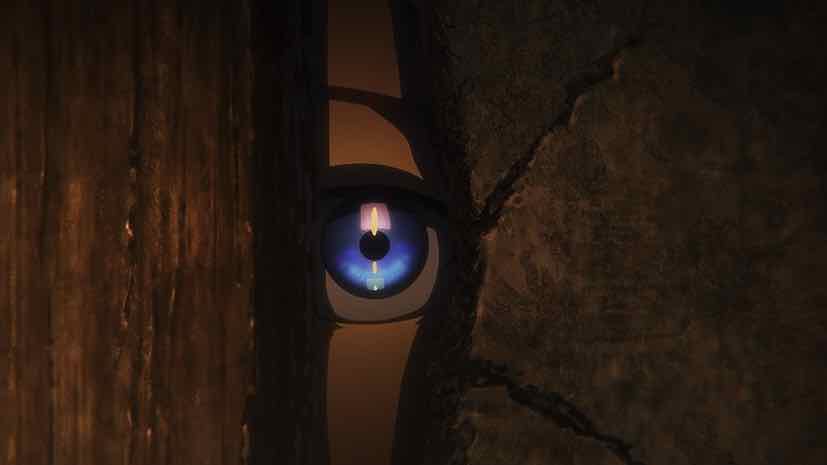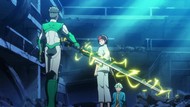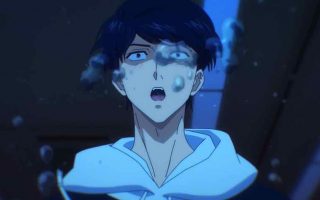Horses for courses, that’s the theme of the day. Karasu wa Aruji o Erabanai is a match made in Heaven for me, obviously. But also for Studio Pierrot. They have an unerringly steady hand with this sort of material, to the point where there’s literally no studio I would trust more with any work of this genre that I cared about. With anyone else – even the likes of Bones or Wit – you’d run the risk of an adaptation that lost the essential nature of the original in narrative terms. The tradeoff would be flashier visuals, but it’s a gamble I wouldn’t want to make if I had the choice.
Yatagarasu is generally great, though the thread with Yukiya and the Prince continues to be the more riveting one. We start with Wakamiya losing Yukiya in a dice game – crapping out on a bet too large (theoretically) for him to cover. He leaves the raven chick behind as a dogsbody for the brothel where the game was held – and that’s the last Yukiya sees of his master for six weeks. Naturally the boy is good at his duties, and the staff clearly take a shine to him (it’s hard to imagine a kid his age could escape a sentence of that length in that setting with his chastity intact).
It soon becomes clear that this was all a ruse by the Prince – a chance to place a pair of eyes in a location where he knows his enemies gather. What’s interesting is not that the Prince did this – we know he’s playing five-dimensional chess as a means of survival – but that he didn’t tell Yukiya. Especially the matter of whether he really “forgot”, as he claims, or kept Yukiya in the dark on purpose. And if it’s the latter, why? I might speculate the following – he trusted Yukiya to seize the opportunity presented to him and keep his eyes and ears open, and thought the boy would act more naturally if he was acting on his own initiative.
When Wakamiya and Sumio finally come for Yukiya, he learns of the existence of a network of tunnels running through the mountain city – handy for court ravens on illicit trysts, but also for those hiding from their enemies. Yukiya is a very smart child, and he has indeed seized the moment. A meeting took place during his indentured servitude, called by Rokon and consisting of a network of Natsuka loyalists. Among them is Kazumichi (Yamamoto Manta), father of the young noble Yukiya baited into soiling his own bed in the premiere. Rokon has determined that he was the one who ordered the attempt on Wakamiya’s life, and that rash action has not endeared him to Natsuka’s strongman.
As with much of Karasau wa Aruji o Erabanai, it’s hard to know how much of this is genuine and how much is theatre. Obviously Rokon knew he would be making an example of Kazumichi that night. I suspect his claim that he called the meeting without Natsuka’s knowledge is BS, part of the plausible deniability strategy central to Natsuka’s operations. How about Atsufusa (Kawanishi Kengo)? That’s less clear. If Atsufusa was in on the operation, then his performance was the key to the evening’s success. And the question of whether he knew is critical to assessing his appearance at Wakamiya’s house at the close of the episode.
Wakamiya is clearly a ruthless man – though if he wasn’t, he likely wouldn’t still be alive – but he’s not oblivious to the emotional implications of events. He recognizes that Yukiya is troubled by the role his humiliation of Kazumichi’s son played in what happened to the man. Yukiya believes that Kazumichi isn’t smart enough to have masterminded the intricate assassination attempt, and he’s almost surely correct – and that the Empress is the obvious guiding hand from the shadows. But without proof that knowledge is useless to them. I still have questions about Natsuka’s ultimate aims here – I don’t think they’re as simple as wanting his brother dead and his ass on the throne. Atsufusa’s visit may shed some light on those aims.
The princesses, meanwhile, continue to await Wakamiya’s presence in vain. The upcoming Tanabata (or its Chinese ancestor the Qixi Festival, if you believe that’s where this series is set) seems to present Wakamiya with an obligation he can’t avoid, however. The four maidens “sew” (a single stitch for most of them) special kimono, and whichever one he chooses supposedly tips the Prince’s inclinations. Asebi has received a gift from Fujinami – a koto called “Drifting Cloud“. And her lady in waiting’s reaction to seeing it suggests that the instrument holds a deeper significance in this complicated ritual dance of power.
The post Karasu wa Aruji o Erabanai (YATAGARASU: The Raven Does Not Choose Its Master) – 05 appeared first on Lost in Anime.




